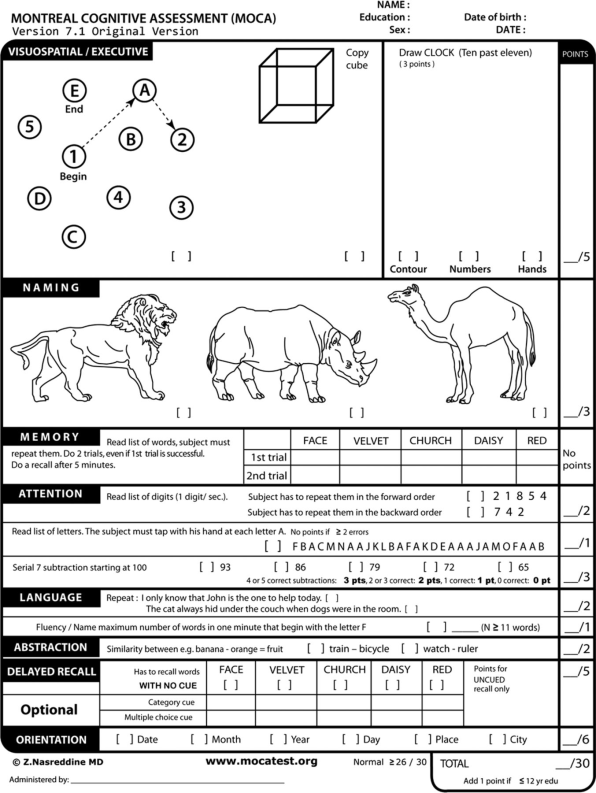

MethodsĪ total of 230 community-dwelling adults aged 50 years and older taking part in clinical trials completed the MoCA by videoconference. This study had for objective to develop French-Quebec normative data for videoconference-administration of the MoCA that consider sociodemographic characteristics. The normative data specific to the context of videoconference administration is essential, particularly that consider sociodemographic characteristics. Recent reviews appear to confirm the validity of a wide range of neuropsychological tests for teleneuropsychology and among these, the Montreal Cognitive Assessment (MoCA), a cognitive screening test widely used in clinical settings. Conclusions: Acute, single-channel EEG can provide unique, non-overlapping clinical information, which may facilitate objective prediction of functional outcome after stroke.The COVID-19 pandemic forced health professionals to rapidly develop and implement telepractice and remote assessments. Acute theta values ≥0.25 were associated with good outcomes, with positive (67-83%) and negative predictive values (70-90%) comparable to those obtained using the NIHSS. Functional outcomes correlated with acute theta values (r s 0.45-0.60), with the strength of associations equivalent to previously reported values obtained from conventional multi-channel systems. Results: One-third to one-half of participants experienced incomplete post-stroke recovery, depending on the time point and measure.


Classification of good outcomes (mRS ≤1 or mBI ≥95) was also examined using Receiver Operator Curve analyses. Acute EEG measures were correlated with functional outcomes and compared to an early neurological examination of stroke severity using the National Institute of Health Stroke Scale (NIHSS). At 30 and 90 days, measures of disability (modified Rankin Scale mRS) and involvement in daily activities (modified Barthel Index mBI) were obtained. Methods: Resting-state EEG recorded at a single left pre-frontal EEG channel (FP1) was obtained from 16 adults within 72 h of first stroke. Objective: The current cohort study examined the relationship between acute single-channel EEG and functional outcomes after stroke. However, skepticism persists whether EEG can provide the same prognostic value as neurological examination. Electroencephalography (EEG) has long been utilized to describe and monitor brain function following neuro-trauma, and technological advances have improved usability in the acute setting. Lack of timed measures of processing speed may explain the relative insensitivity of the MoCA and ACE-R to single nonmemory domain impairment.īackground: Early and objective prediction of functional outcome after stroke is an important issue in rehabilitation. However, optimal cutoffs will depend on use for screening (high sensitivity) or diagnosis (high specificity). Conclusions-The MoCA and ACE-R had good sensitivity and specificity for MCI defined using the Neurological Disorders and Stroke–Canadian Stroke Network Vascular Cognitive Impairment Battery ≥1 year after transient ischemic attack and stroke, whereas the MMSE showed a ceiling effect. Sensitivity and specificity for MCI were optimal with MoCA 70% at a cutoff of <29, mainly due to relative insensitivity to single-domain impairment. Results-Among 91 nondemented subjects completing neuropsychological testing (mean/SD age, 73.4/11.6 years 44% female 56% stroke), 39 (42%) had MCI (amnestic multiple domain=10, nonamnestic multiple domain=9, nonamnestic single domain=19, amnestic single domain=1). MCI was diagnosed using modified Petersen criteria in which subjective cognitive complaint is not required (equivalent to cognitive impairment–no dementia) and subtyped by number and type of cognitive domains affected. Methods-One hundred consecutive non-institutionalized patients had the MMSE, MoCA, ACE-R, and National Institute of Neurological Disorders and Stroke–Canadian Stroke Network Vascular Cognitive Impairment Harmonization Standards Neuropsychological Battery ≥1 year after transient ischemic attack or stroke in a population-based study. We studied the relationship between MoCA, ACE-R, Mini-Mental State Examination (MMSE) and mild cognitive impairment (MCI) in patients with cerebrovascular disease and mild cognitive impairment (MCI). Background and Purpose-The Montreal Cognitive Assessment (MoCA) and Addenbrooke's Cognitive Examination–Revised (ACE-R) are proposed as short cognitive tests for use after stroke, but there are few published validations against a neuropsychological battery.


 0 kommentar(er)
0 kommentar(er)
